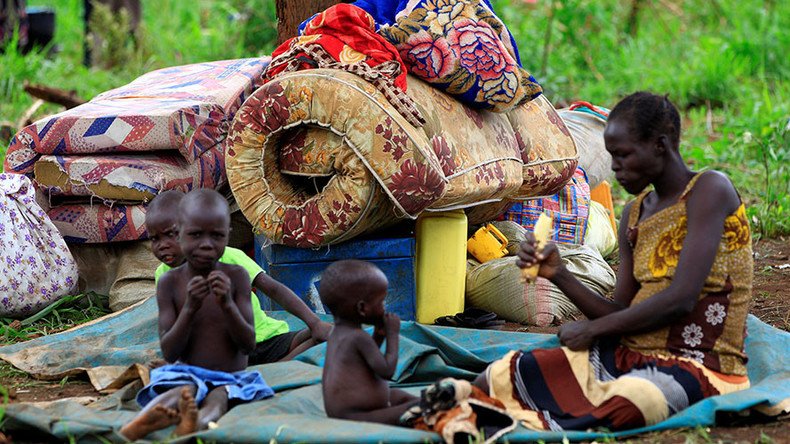Oil companies exploiting famine and financial ruin in South Sudan

South Sudan’s vulnerable financial state is making the civil-war-torn state easy prey for opportunistic oil and gas companies that could be offering Juba a fraction of the energy profits they would earn under stable circumstances.
The South Sudanese government and three humanitarian agencies declared a famine in some parts of the country in February, while the newly independent nation is desperately trying to bring its oil back online. A string of deals signed by President Salva Kiir over the past four months has demonstrated the country’s desperation for fresh streams of revenue as the civil war now approaches its four-year anniversary.
“The government is working hard to reinvigorate the petroleum industry in South Sudan by creating an enabling environment for international oil and gas companies to invest and operate,” according to Petroleum Minister Ezekiel Lul Gatkuoth. “It is up to the oil companies to come in, explore and produce. Partnership is what fuels the oil industry.”
The East African reported this week that oil companies with regional headquarters in Kampala, Nairobi, Addis Ababa, as well as several European cities are setting up meetings with top South Sudanese officials, and Kiir’s administration is happy to oblige the invitations.
Toward the end of last year, Suiss Finance Luxembourg AG announced a $10.5 billion deal that could rise to $105 billion in value when joint ventures in infrastructure and transportation are taken into account. While some may view this as a large stepping stone toward bringing back its oil revenues, Kiir’s critics were quick to attack the leader over the deal once news broke, referring to what they called “shadowy” businessmen from Kampala who had brokered the contract.
Another recent deal involves Oranto Petroleum, which has committed to a $500 million “comprehensive exploration campaign, starting immediately” to evaluate oil prospects in the 25,150 kilometers that make up Block B3. Juba approved the block a couple of weeks ago, giving Oranto a 90 percent share, while keeping only 10 percent for the government’s Nile Petroleum (Nilepet). Oranto is a subsidiary of Nigeria’s Atlas Petroleum International Ltd (“Atlas”).
The East African said the deal with Oranto has drawn harsh criticism due to a report from technical officials in the Ministry of Petroleum in which claims were made that the company lacked the technical expertise and financial capacity to manage the Block B3 project.
Oranto Petroleum Chairman Prince Arthur Eze offered a rebuttal, telling reporters that his company stood “at the vanguard of African firms exploring and developing African assets,” adding that the company would elaborate with “partners to bring to light the immense potential of Block B3.”
“We believe the petroleum resources of Block B3 are vast. To reach our target of more than doubling current oil production, we need committed new entrants like Oranto,” Petroleum Minister Ezekiel Lul Gatkuoth said in defense of his department’s decision. Later addressing Bloomberg, he added: “Anybody who is willing to do business with us, they must actually show that they are ready and we will sign and if you are not ready to do business with us, get out of the way.”
World Oil described Oranto’s investment as a “bet” that South Sudan could end its civil war within three years to attract new investments to its ailing oil sector.
Atlas owns and operates 20 oil and gas fields in Africa, making it the largest African explorer. Its influence spans Benin, Côte d’Ivoire, Equatorial Guinea, Ghana, Liberia, Namibia, Nigeria, São Tomé and Príncipe, Senegal, and South Sudan.
Oranto has a history of finalizing oil deals with governments, and later selling oilfield rights to larger international corporations, effectively serving as a middleman.
Read more on Oilprice.com: Don't Believe The Hype: Oil Markets Far From Recovery
A 2006 report by the Liberian Auditing Commission named the company in a bribery scandal as it aimed to unduly influence parliament members tasked with ratifying oil and gas concessions. Oranto had already planned to sell rights to the concessions to another firm and was using bribes to expedite the governmental process, according to the report.
In Mali, Oranto saw its exploration contract cancelled in 2014 as part of 12 exploration agreements that were cancelled over “various offences”.
Despite the allegations to the contrary, Eze characterized Oranto’s venture in South Sudan last month as a “long-term collaboration,” suggesting the company may not be planning to abscond.
The recent attacks on foreigners working on South Sudan’s oil and gas facilities serve as a warning for multinationals to stay away from the new country’s national resources, just as oil prices recover enough for Juba to begin profiting from the oil sector. This means South Sudan will have to offer a premium to companies willing to work in the country. Middlemen may not appear to be the perfect partners for struggling governments, but they are giving Juba a means to reach multinationals that can bankroll the development of its energy resources.
This article was originally published on Oilprice.com















